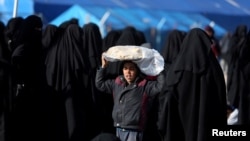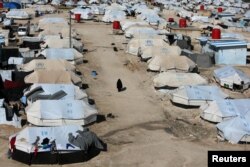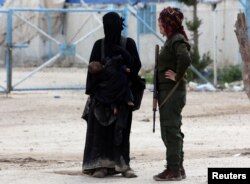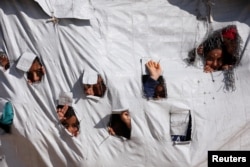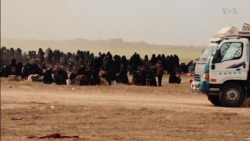With the Islamic State's physical caliphate destroyed, the next challenge for many countries is what to do with hundreds of children of IS militants stranded in Kurdish-held refugee camps of northeastern Syria. Those born to IS foreign fighters and Syrian mothers face the most uncertain future of all, according to local rights activists and experts.
The U.S.-backed Syrian Democratic Forces (SDF) announced the final victory over IS in March after weeks of clashes in the eastern Syrian town of Baghuz.
The operation brought many thousands of people to a makeshift refugee camp called al-Hol, consisting of fleeing civilians, arrested IS fighters and their family members.
The camp managers are holding 10,000 women and children with ties to IS foreign fighters in a separate area of the camp, with children under 12 accounting for about 65% of this group, according to the International Committee for the Red Cross.
Hannah Grigg, a researcher at the Syria Justice and Accountability Center, told VOA those in the group who are born to IS foreign fighters and Syrian mothers could end up stateless as it remains uncertain which parent's nationality each can obtain.
"That is a huge challenge going forward for these children added to the social stigma because they are associated with IS," Grigg said.
She noted that many of these children do not have strong claims to citizenship in their patriarchs' home countries. Similarly, Syrian nationality laws do not allow citizenship claims based on mother's nationality.
Even if the Syrian state amends its rules to grant them citizenship, Grigg argued, many of the children are carrying their fathers' physical features, making them stand out as foreigners with little hope of making their way into the society.
Grass-roots campaigns
Many activists in Syria are organizing initiatives to face this problem among many other issues left behind by IS.
One of the campaigns — "Who is Your Husband?" — is trying to help reintegrate the Syrian women and children born to IS foreign fighters to the society by helping educate communities.
The group, based in the northwestern governorate of Idlib, has documented more than 1,700 women married to foreign fighters, who joined IS or al-Qaida-aligned militants. It vows to continue its efforts, despite threats from the Hay'at Tahrir al-Sham (HTS) group.
Naseeb Abdul Aziz, the manager of the campaign, told VOA his team also is investigating the reasons that pushed Syrian women to marry the foreign fighters — sometimes despite their families' strong objections. They also work on raising women's awareness about the perils of such marriages and the consequences for their children.
"Many of these foreign fighters either fled or were killed without knowing their real identities, leaving these women and children to deal with their families, societies and fate," said Aziz.
"These children remain without any civil rights. They will be deprived from their rights of having an identity, going to school and finding a job," he said, adding that will be just one dimension of the difficult challenges facing Syria in the future.
In addition, Aziz pointed to dealing with undocumented marriages and unregistered children, along with the deradicalization of women and children brainwashed by extremist ideology.
Pressure on camps
Officials in the Kurdish-controlled northeast region say an immediate solution for the detained IS relatives is necessary, particularly for the children who are facing diseases caused by poor living conditions.
WATCH: Thousands of Children Face Peril in Syrian Camps
Recent figures by the United Nations show that since December 2018, 211 children have died at the al-Hol camp or en route to it because of malnutrition or illness.
Samar Hussein, the co-chair of the Social Affairs and Labor Office of the Kurdish self-proclaimed administration in northeastern Syria, said many children and their mothers at the camp are sleeping in the open air without enough food or water. He pledged to seek international assistance to address the humanitarian needs of the refugees and their ultimate evacuation.
"We are in the process of discussing their fate with the Committee of Foreign Affairs in the self-autonomous region and also with the international coalition," Hussein told VOA.
Both the U.N. and the U.S. government have repeatedly asked that other governments take responsibility for repatriating IS foreign fighters — estimated to be 1,000 jihadists from more than 40 countries, along with their relatives.
Many countries remain reluctant to take them back, however, citing the difficulty of prosecuting the suspected fighters because of the hurdles involved in gathering battlefield evidence.




